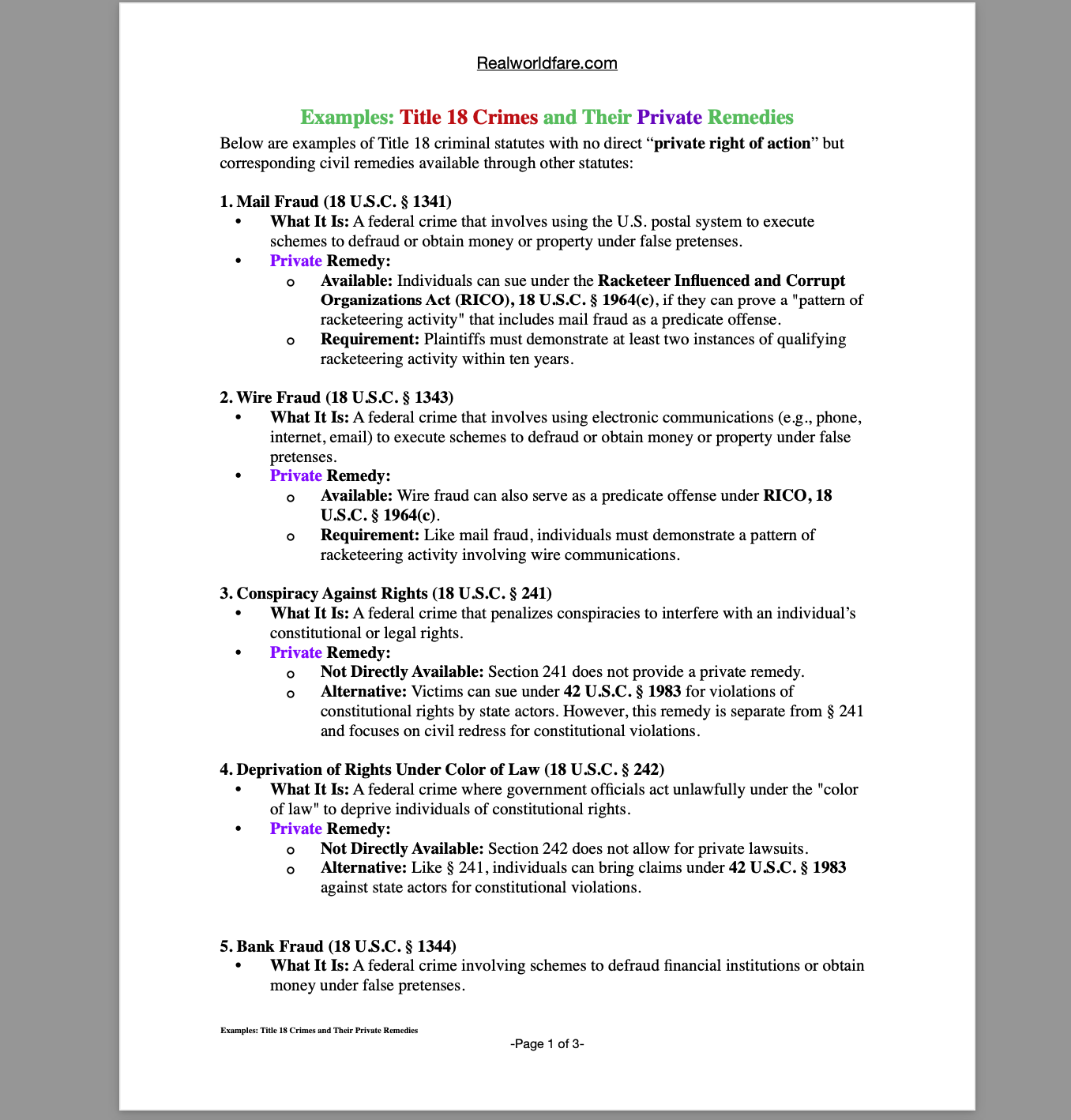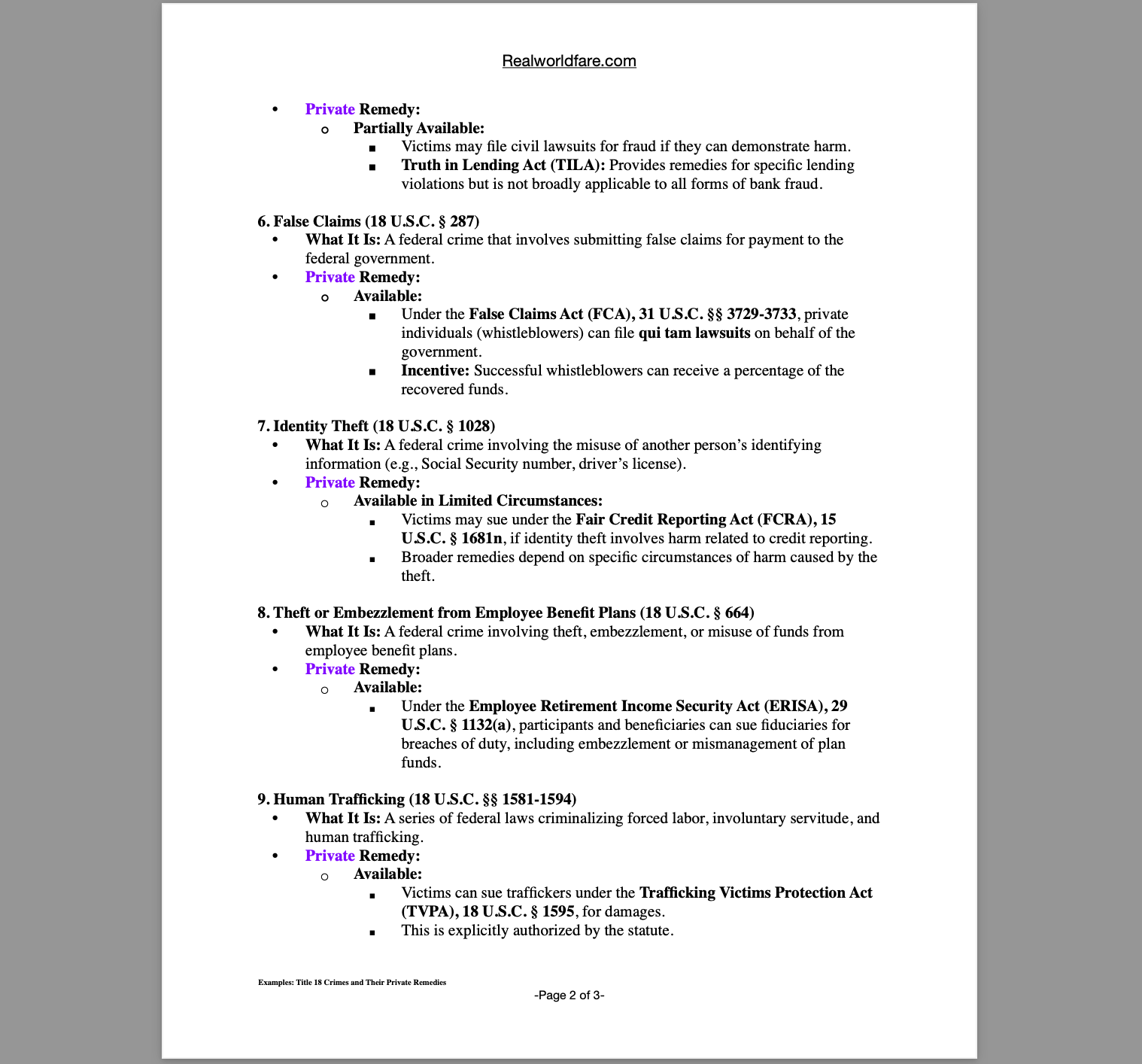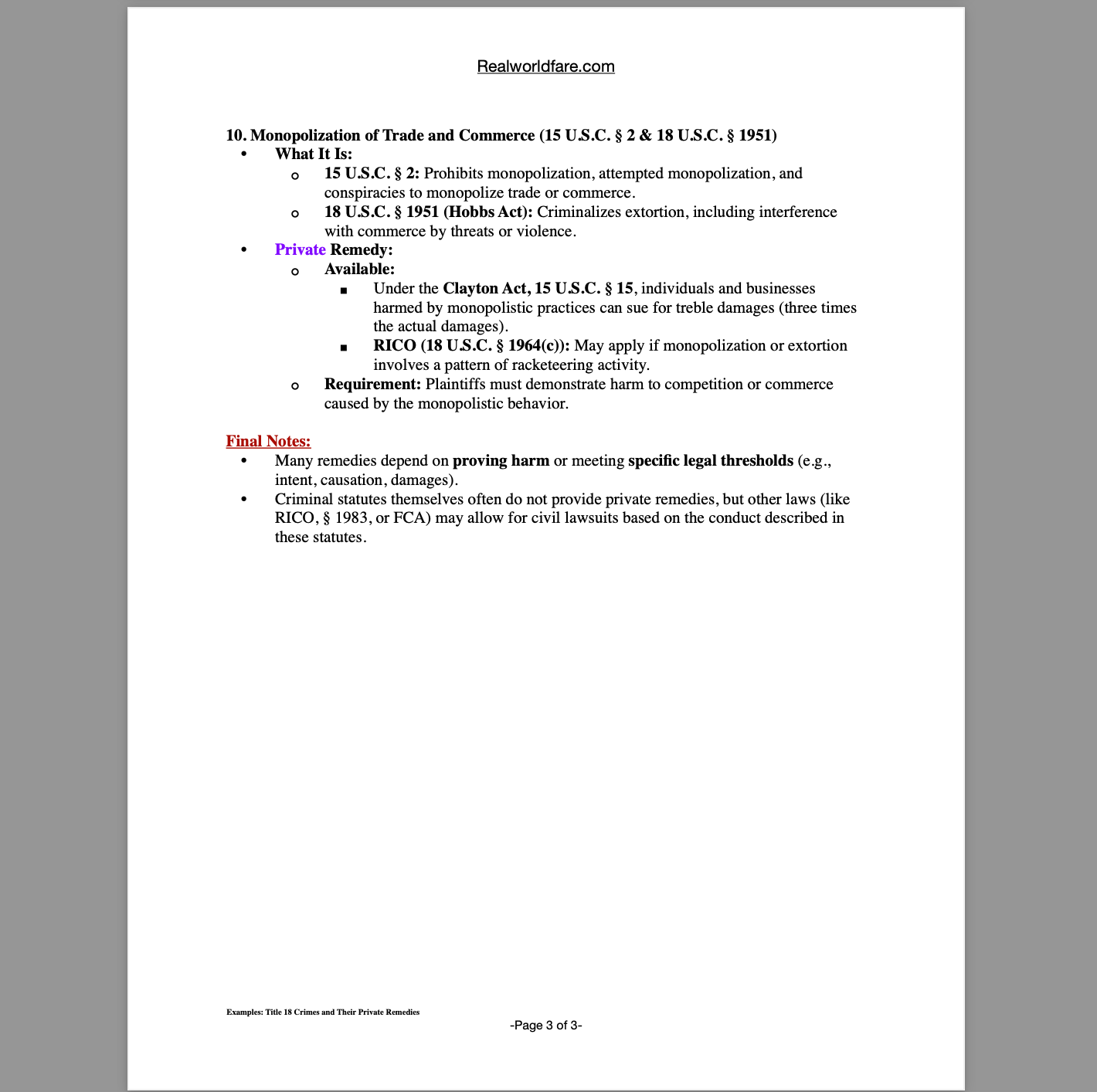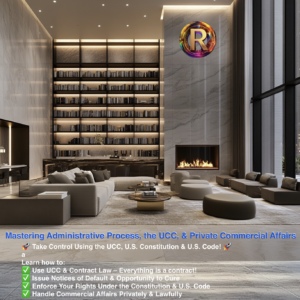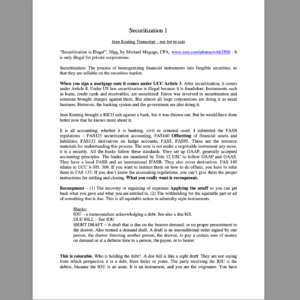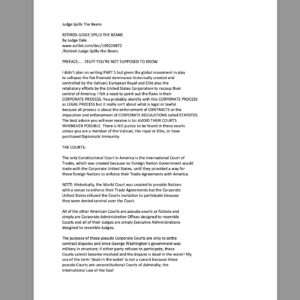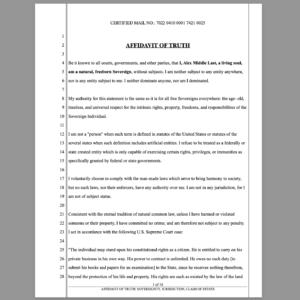What Are Bare Criminal Statutes?
Bare criminal statutes outline behaviors deemed unlawful and specify penalties, such as fines, imprisonment, or both. These laws serve as societal deterrents, ensuring public safety and order.
For example:
- 18 U.S.C. § 1341 (Mail Fraud) criminalizes schemes to defraud via mail but does not grant private individuals the authority to file lawsuits under this statute.
- 18 U.S.C. § 241 (Conspiracy Against Rights) penalizes conspiracies to infringe on constitutional rights but requires government prosecution.
Key Features of Bare Criminal Statutes
- Exclusive Enforcement by Governmental Authorities
Only designated government officials, such as prosecutors, can bring cases under criminal statutes. These officials act on behalf of the public to hold offenders accountable. - No Automatic Private Remedy
Criminal statutes do not inherently grant individuals the ability to seek civil remedies unless explicitly stated. For example, just because a criminal statute penalizes certain conduct does not mean a private individual can sue for damages stemming from that conduct.
What Is a Private Right of Action?
A private right of action enables individuals to bring a lawsuit in civil court to enforce statutory rights or seek remedies for harm. This right can arise in two ways:
- Explicit Private Right of Action
Some statutes explicitly provide for private lawsuits. For instance: - Implied Private Right of Action
In rare cases, courts may find that a statute implies a private right of action, even if not explicitly stated. Courts consider four factors outlined in Cort v. Ash, 422 U.S. 66 (1975):- Whether the plaintiff is part of the class the statute was designed to protect.
- Whether there is legislative intent to create or deny such a remedy.
- Whether granting a private remedy aligns with the statute’s purpose.
- Whether the cause of action traditionally belongs to state law.
Limitations on Private Enforcement of Criminal Statutes
Private citizens cannot prosecute criminal offenses. This principle prevents misuse of the legal system and ensures that criminal law enforcement remains the responsibility of trained public officials.
- Prosecutorial Discretion
Government prosecutors decide whether to pursue a criminal case based on evidence, public interest, and resources. - Judicial Rulings on Private Claims
Courts routinely dismiss private lawsuits based on criminal statutes unless a private right of action is clearly articulated. For instance, a plaintiff cannot file a lawsuit under 18 U.S.C. § 1341 (Mail Fraud) simply because they were harmed by fraudulent activities.
Articulating a Private Right of Action
For a plaintiff to succeed in court, they must rely on a statute that either explicitly or implicitly grants a private right of action. Without such a provision, claims based solely on violations of criminal statutes will be dismissed.
Examples:
- Consumer Protection Laws:
The FDCPA explicitly grants consumers the ability to sue debt collectors for statutory violations. - Civil Rights Laws:
42 U.S.C. § 1983 allows individuals to sue state actors for constitutional violations, such as unlawful searches and seizures. - No Private Right Example:
A plaintiff alleging a violation of 18 U.S.C. § 241 (Conspiracy Against Rights) would have no standing unless they also demonstrated a separate statutory or constitutional basis for a civil claim.
Title 18 of the United States Code
Title 18 of the United States Code primarily governs federal criminal statutes, addressing offenses such as fraud, conspiracy, and theft. While these statutes are criminal in nature and do not directly provide private individuals with a right to sue, there are instances where private remedies are available under other statutes or legal principles.
Examples: Title 18 Statutes and corresponding Private Remedy
1. Mail Fraud (18 U.S.C. § 1341)
- What It Is: A federal crime that involves using the U.S. postal system to execute schemes to defraud or obtain money or property under false pretenses.
- Private Remedy:
- Available: Individuals can sue under the Racketeer Influenced and Corrupt Organizations Act (RICO), 18 U.S.C. § 1964(c), if they can prove a “pattern of racketeering activity” that includes mail fraud as a predicate offense.
- Requirement: Plaintiffs must demonstrate at least two instances of qualifying racketeering activity within ten years.
2. Wire Fraud (18 U.S.C. § 1343)
- What It Is: A federal crime that involves using electronic communications (e.g., phone, internet, email) to execute schemes to defraud or obtain money or property under false pretenses.
- Private Remedy:
3. Conspiracy Against Rights (18 U.S.C. § 241)
- What It Is: A federal crime that penalizes conspiracies to interfere with an individual’s constitutional or legal rights.
- Private Remedy:
- Not Directly Available: Section 241 does not provide a private remedy.
- Alternative: Victims can sue under 42 U.S.C. § 1983 for violations of constitutional rights by state actors. However, this remedy is separate from § 241 and focuses on civil redress for constitutional violations.
4. Deprivation of Rights Under Color of Law (18 U.S.C. § 242)
- What It Is: A federal crime where government officials act unlawfully under the “color of law” to deprive individuals of constitutional rights.
- Private Remedy:
- Not Directly Available: Section 242 does not allow for private lawsuits.
- Alternative: Like § 241, individuals can bring claims under 42 U.S.C. § 1983 against state actors for constitutional violations.
5. Bank Fraud (18 U.S.C. § 1344)
- What It Is: A federal crime involving schemes to defraud financial institutions or obtain money under false pretenses.
- Private Remedy:
6. False Claims (18 U.S.C. § 287)
- What It Is: A federal crime that involves submitting false claims for payment to the federal government.
- Private Remedy:
- Available:
- Under the False Claims Act (FCA), 31 U.S.C. §§ 3729-3733, private individuals (whistleblowers) can file qui tam lawsuits on behalf of the government.
- Incentive: Successful whistleblowers can receive a percentage of the recovered funds.
- Available:
7. Identity Theft (18 U.S.C. § 1028)
- What It Is: A federal crime involving the misuse of another person’s identifying information (e.g., Social Security number, driver’s license).
- Private Remedy:
- Available in Limited Circumstances:
- Victims may sue under the Fair Credit Reporting Act (FCRA), 15 U.S.C. § 1681n, if identity theft involves harm related to credit reporting.
- Broader remedies depend on specific circumstances of harm caused by the theft.
- Available in Limited Circumstances:
8. Theft or Embezzlement from Employee Benefit Plans (18 U.S.C. § 664)
- What It Is: A federal crime involving theft, embezzlement, or misuse of funds from employee benefit plans.
- Private Remedy:
- Available:
- Under the Employee Retirement Income Security Act (ERISA), 29 U.S.C. § 1132(a), participants and beneficiaries can sue fiduciaries for breaches of duty, including embezzlement or mismanagement of plan funds.
- Available:
9. Human Trafficking (18 U.S.C. §§ 1581-1594)
- What It Is: A series of federal laws criminalizing forced labor, involuntary servitude, and human trafficking.
- Private Remedy:
- Available:
- Victims can sue traffickers under the Trafficking Victims Protection Act (TVPA), 18 U.S.C. § 1595, for damages.
- This is explicitly authorized by the statute.
- Available:
10. Monopolization of Trade and Commerce (15 U.S.C. § 2 & 18 U.S.C. § 1951)
- What It Is:
- 15 U.S.C. § 2: Prohibits monopolization, attempted monopolization, and conspiracies to monopolize trade or commerce.
- 18 U.S.C. § 1951 (Hobbs Act): Criminalizes extortion, including interference with commerce by threats or violence.
- Private Remedy:
- Available:
- Requirement: Plaintiffs must demonstrate harm to competition or commerce caused by the monopolistic behavior.
Final Notes:
- Many remedies depend on proving harm or meeting specific legal thresholds (e.g., intent, causation, damages).
- Criminal statutes themselves often do not provide private remedies, but other laws (like RICO, § 1983, or FCA) may allow for civil lawsuits based on the conduct described in these statutes

